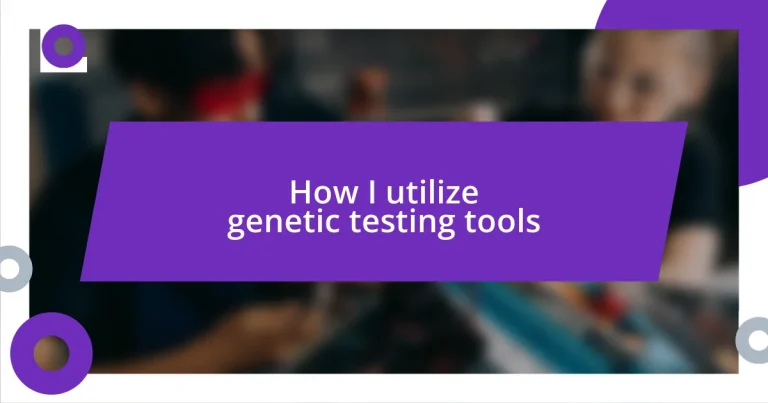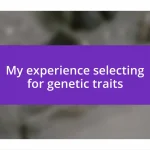Key takeaways:
- Genetic testing offers deep insights into personal health and ancestry, allowing individuals to make informed choices about their health journey.
- There are various types of genetic tests, including carrier screening, predictive testing, and pharmacogenetic testing, each serving specific health-related purposes.
- Ethical considerations, including privacy, discrimination, and emotional support, are crucial as genetic testing technology advances and becomes more integrated into healthcare.
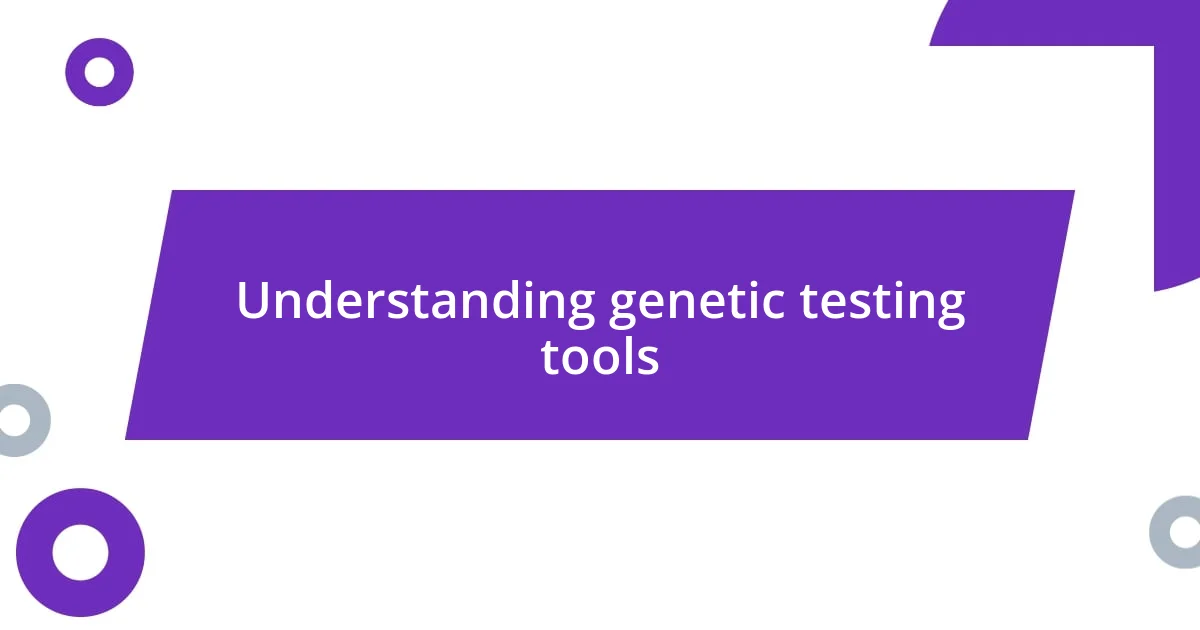
Understanding genetic testing tools
Genetic testing tools have rapidly evolved, offering insights into our DNA that I never thought possible. I remember the moment I received my first genetic report; it felt like holding a map to my own history. It’s fascinating how these tests can uncover not just ancestry but also potential health risks that we might carry in our genes.
When I think of genetic testing, I wonder, “What can it tell me about my future?” These tools can analyze specific markers in our DNA that link to various conditions, which can empower us to make informed health choices. There’s something both exhilarating and a bit daunting about realizing that I have a say in my own health destiny, based on what my genes reveal.
The emotional weight of understanding genetic predispositions is profound. For instance, learning about a hereditary condition that runs in my family brought forth anxiety but also motivated me to seek proactive measures. Each test result is not merely data; it’s an intimate piece of my story, and I’ve found that sharing these experiences can resonate deeply with others navigating similar paths.
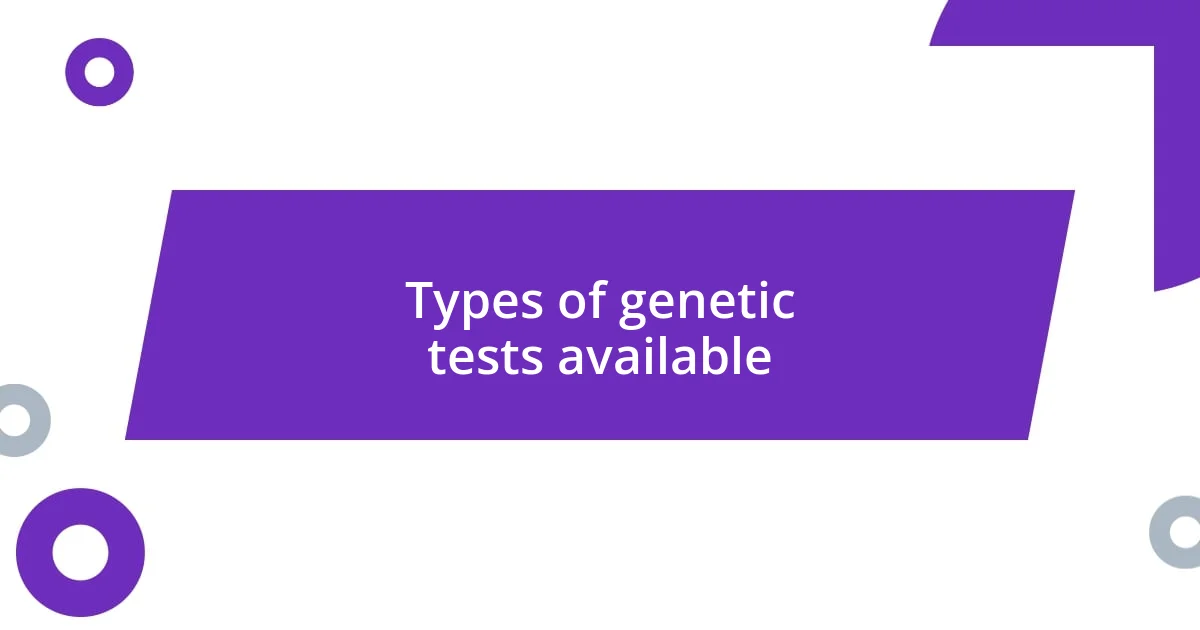
Types of genetic tests available
When considering the types of genetic tests available, there’s a spectrum that caters to varied interests and needs. Some tests, like carrier screening, are specifically designed to determine whether someone carries a gene for a genetic disorder, which can be crucial for couples planning to start a family. I remember having this conversation with a close friend who was considering having children. It was enlightening to discover how genetic tests could empower them to make informed decisions about their family’s future.
Another category is predictive testing, which helps ascertain the likelihood of developing certain conditions, such as Huntington’s disease or breast cancer due to BRCA mutations. Reflecting on my own experience with predictive testing, I felt a mix of anticipation and apprehension. The idea of being forewarned about a condition felt both like a gift and a heavy responsibility to bear.
Finally, pharmacogenetic testing is fascinating as it examines how our genes affect our reaction to medications. Personally, after experiencing side effects from a medication, I turned to this type of testing, and it was reassuring to know that my genetic makeup could guide more effective treatment choices. Understanding these different tests has truly expanded my perception of my health and wellness journey.
| Type of Genetic Test | Description |
|---|---|
| Carrier Screening | Identifies carrier status for genetic disorders, particularly helpful for family planning. |
| Predictive Testing | Evaluates the risk of developing certain genetic conditions in the future. |
| Pharmacogenetic Testing | Assesses how genes influence responses to specific medications. |
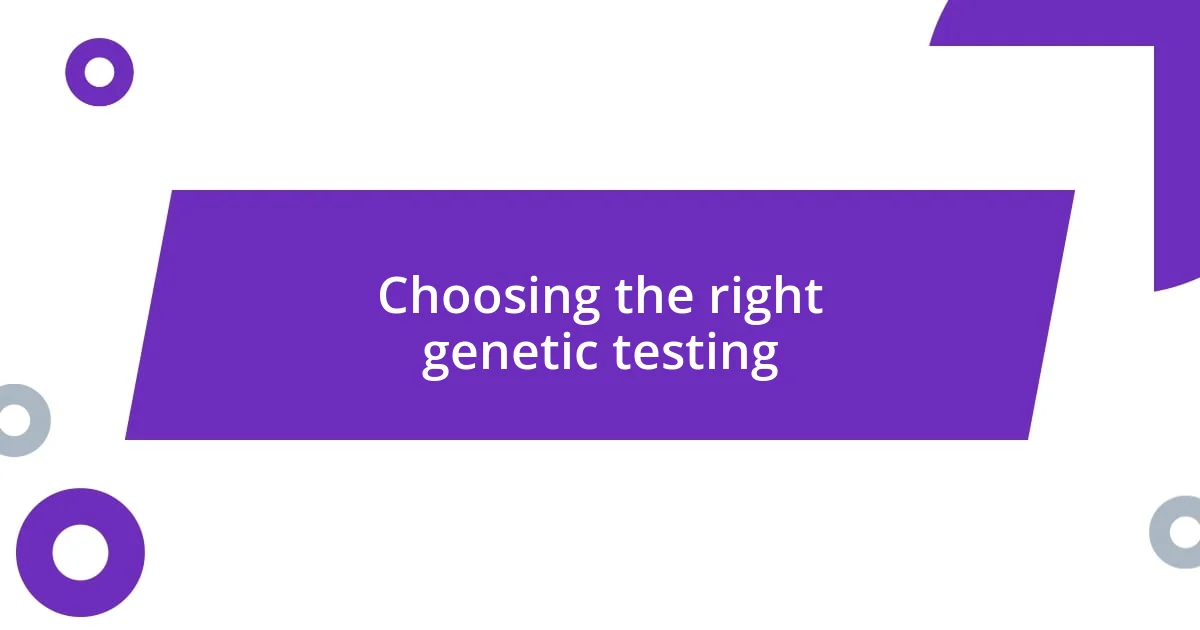
Choosing the right genetic testing
When it comes to choosing the right genetic testing, it’s essential to identify your primary motivation. For me, the decision often hinges on my health goals or family planning aspirations. I remember standing at the crossroads of deciding whether to pursue testing for hereditary risks or simply learn about my ancestry. It felt like a pivotal moment—one that could shape my future decisions and the approach I wanted to take regarding my health.
Here’s a quick guide to help narrow down the options:
- Identify Your Purpose: Are you looking for insights into your ancestry, potential health risks, or specific medication responses?
- Consider Medical History: Evaluate family health history to determine if targeted testing may reveal risks relevant to your lineage.
- Consult Healthcare Professionals: Don’t hesitate to discuss options with a genetic counselor or your doctor; their expertise can guide your decision-making process.
- Weigh Emotional Readiness: Understand that some results can be overwhelming; ensure you’re prepared for any emotional implications that may arise.
Ultimately, making a thoughtful choice can lead to a more meaningful experience, reflecting both what I want to learn and how I envision my healthcare journey unfolding.
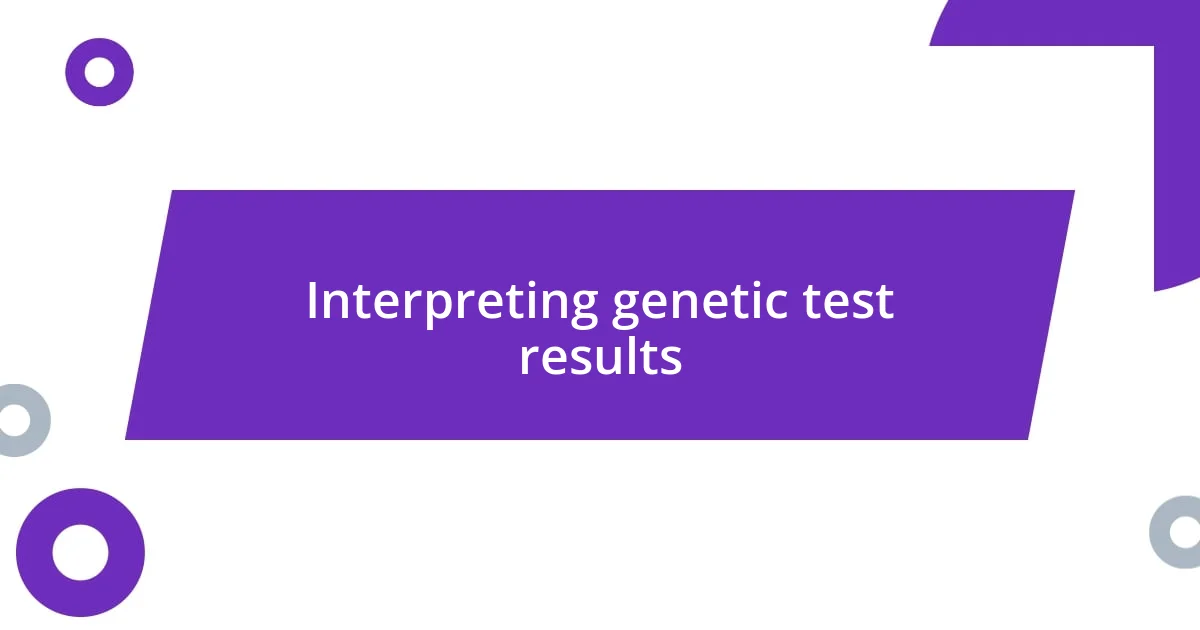
Interpreting genetic test results
Interpreting genetic test results can feel like interpreting a new language. When I received my results, I was surprised by the sheer amount of information—some clear, some muddled. As I deciphered the data, I couldn’t help but wonder how a simple strand of DNA could hold so many secrets about my health and future.
What struck me most was how context plays a crucial role in interpretation. For instance, a genetic variant might indicate a risk for a condition, but without understanding family health history, its significance can be lost. I recall discussing my results with a friend who had a family history of certain diseases; it made me realize how personalized this process truly is, and how each person’s interpretation might differ based on their unique background.
Ultimately, it’s vital to discuss your findings with a healthcare professional. I learned firsthand that expert insights can clarify ambiguous results and help you understand the implications of your genetic makeup. Having that conversation transformed my anxiety into empowerment, as I gained a clearer picture of my health journey and the steps I could take moving forward.
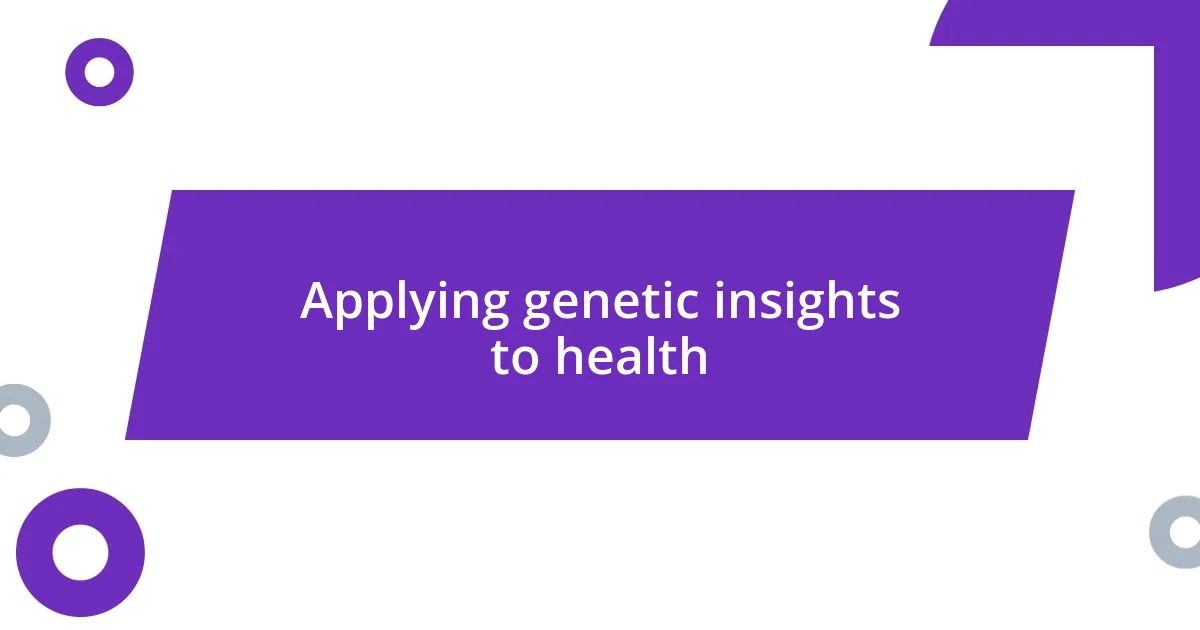
Applying genetic insights to health
Understanding how to apply genetic insights to health has truly transformed my perspective on personal well-being. For instance, after getting my test results, I discovered a predisposition to high cholesterol, which led me to change my diet more consciously. Have you ever had a revelation that made you rethink your everyday choices? That was a defining moment for me—it was no longer just about my genes; it was about taking action to modify my lifestyle.
Another fascinating aspect is how genetic insights can inform proactive health screenings. I remember discussing my results with a doctor, who suggested tailored screening based on my genetic makeup. It was such a relief to know that I could potentially catch issues before they became serious. This preventive approach empowered me to be more involved in my health care, reminding me that understanding my genetics is just the beginning of a journey.
When I think about the broader implications of this knowledge, I often reflect on our collective responsibility to share these insights. How many people overlook their genetic risks simply because they don’t have the information? By discussing our experiences and findings, we create a ripple effect. I believe that when we share our paths, it encourages others to explore their genetic health, leading to a more informed and health-conscious society.
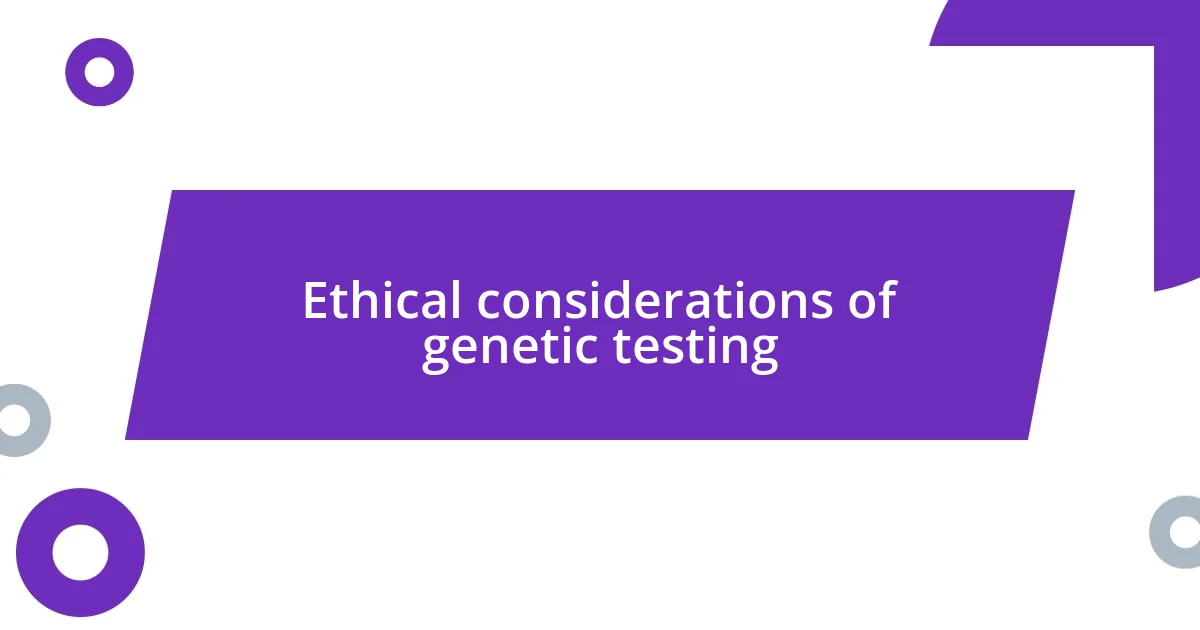
Ethical considerations of genetic testing
When diving into the ethics of genetic testing, I often find myself grappling with the implications of privacy. After I received my results, the question lingered: who else could access this sensitive information? I remember feeling uneasy at the thought that my genetic data could potentially be shared without my consent. It’s vital for companies to establish transparent policies that safeguard personal data, ensuring individuals maintain control over their genetic information.
Another ethical question surrounds the potential for discrimination. My friend once shared her anxiety about how employers may use genetic testing to profile candidates, which made me realize how fragile this balance can be. It left me pondering: what happens if someone is refused a job due to a predisposition to a health condition they might never develop? This kind of discrimination could lead to a type of genetic determinism that overlooks the nuances of an individual’s choices and circumstances.
Lastly, I can’t help but reflect on the emotional ramifications of receiving genetic insights. When I first learned about my risk factors, it was as if a weight had been placed on my shoulders. It prompted me to ask: how do we prepare individuals to cope with potentially distressing information? Adequate support and counseling should accompany genetic testing, helping people navigate the emotional landscape of what their DNA reveals. The conversation around these ethical considerations is critical, as it helps us foster a more thoughtful and responsible approach to genetic testing.
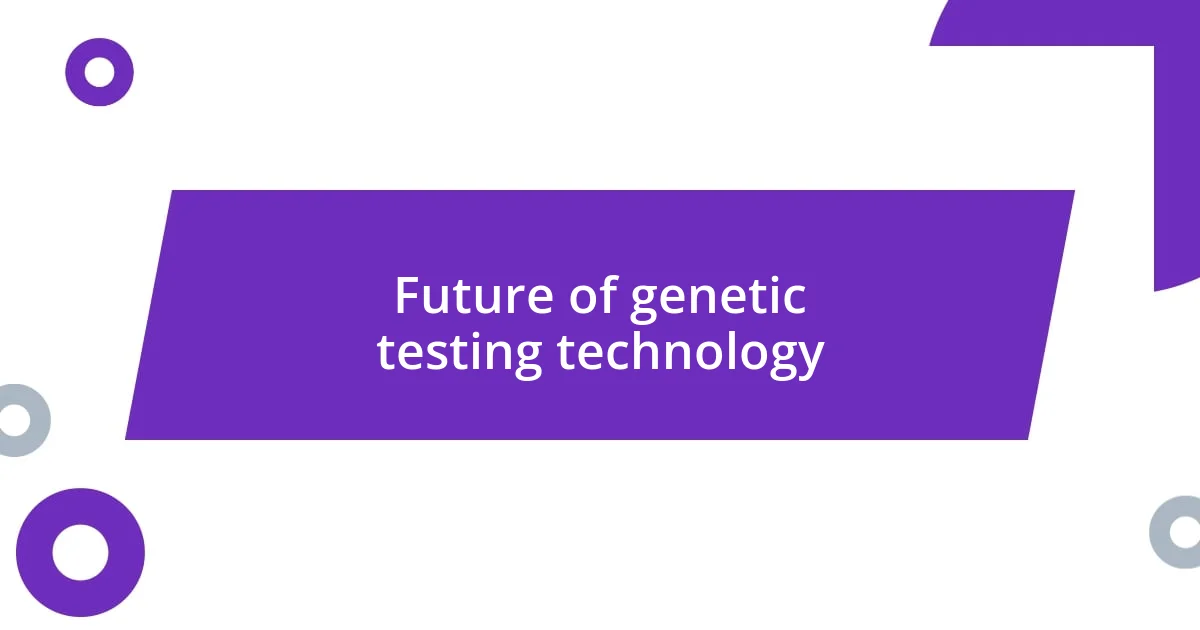
Future of genetic testing technology
The momentum of genetic testing technology is not just exciting—it’s transformative. I recall attending a workshop where researchers demonstrated the potential of CRISPR technology, a gene-editing tool that could enable us not only to understand but also to correct genetic anomalies. Can you imagine a future where we can edit out hereditary diseases before a child is even born? It feels like science fiction, yet it’s becoming a budding reality.
Looking ahead, the integration of artificial intelligence (AI) with genetic testing holds incredible promise. I recently chatted with a bioinformatics expert who spoke about algorithms that can analyze an individual’s genetic data against vast databases to predict health risks more accurately than traditional methods. It left me wondering—how might our healthcare decisions evolve if we had near-instant insights into our genetic predispositions? The prospect of personalized medicine, tailored not just to groups but to individuals, feels like a game-changer in our health landscape.
As these technologies advance, I think about the emotional journey many of us will embark upon alongside our newfound genetic knowledge. Will we be ready to handle the complexities that come with this insight? For me, navigating these revelations can be daunting, creating a cocktail of hope and anxiety. I believe open discussions about genetic testing experiences can lay a foundation for better emotional support systems, ensuring everyone feels equipped to embrace this brave new world.












